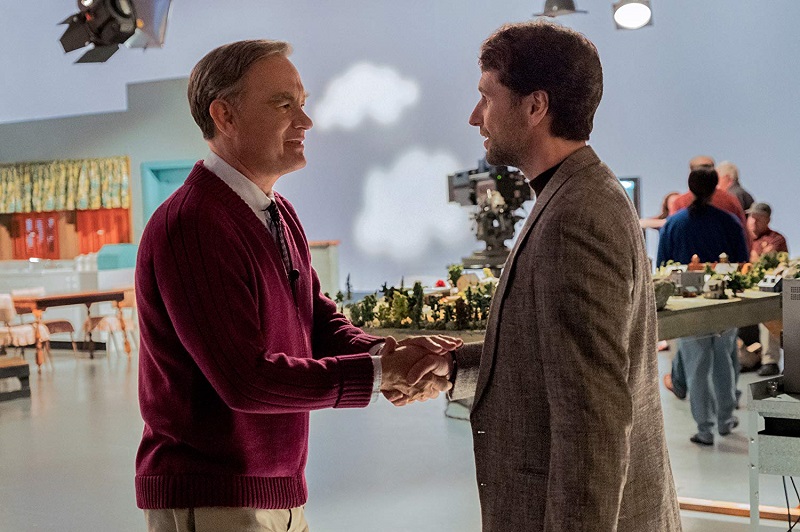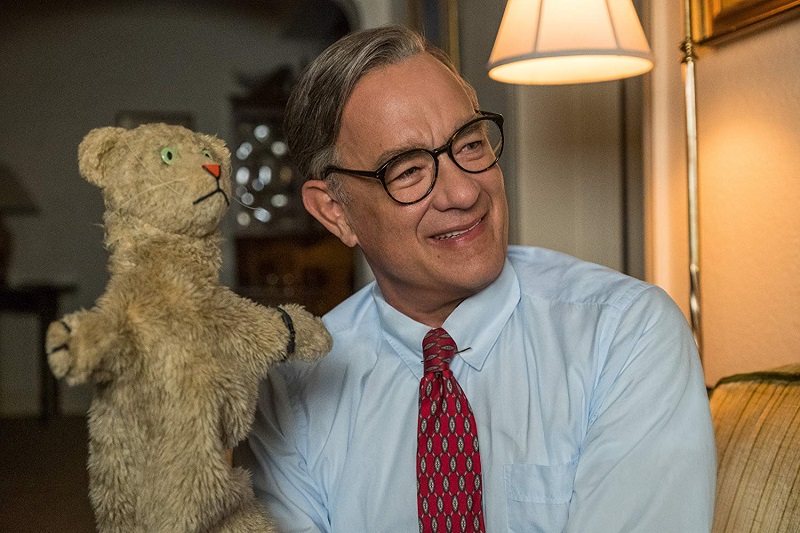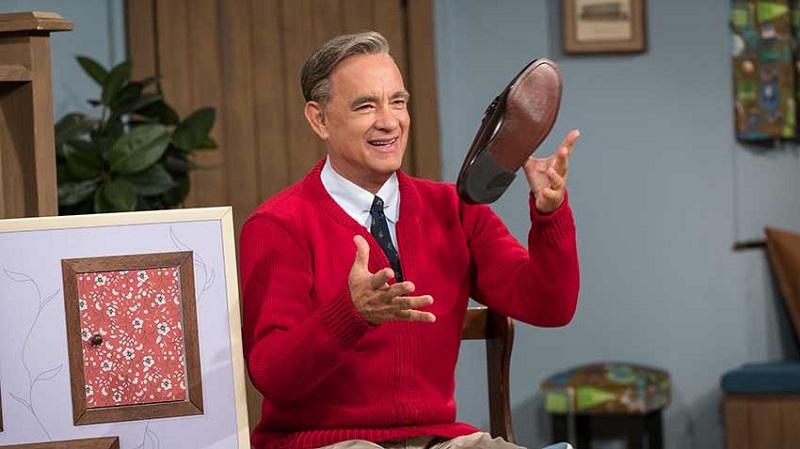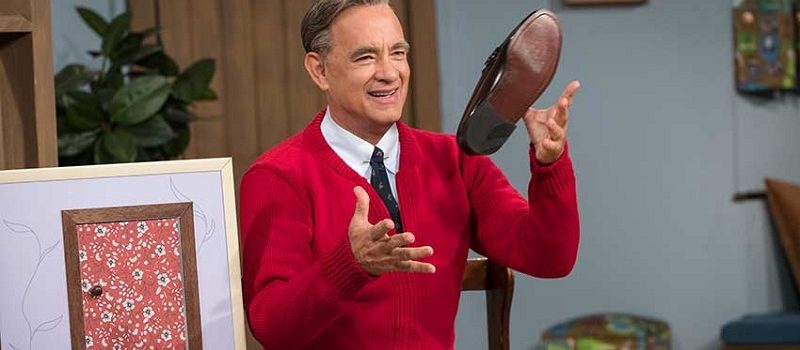Lloyd Vogel (Matthew Rhys of The Americans acclaim) is an Esquire journalist who is tasked by his editor with penning a short piece on Fred Rogers (Tom Hanks) for an upcoming issue that spotlights American heroes. In Marielle Heller’s A Beautiful Day in the Neighborhood, it is made crystal clear that Vogel is not a fan of Mr. Rogers or his children’s television program that has influenced countless souls since it debuted in February of 1968.

Now, it’s not that Vogel doesn’t like Rogers or his show. It has simply escaped his radar and we learn, for good reason. When he informs his wife, Andrea Vogel (Susan Kelechi Watson), who his next profile is, with one line she encapsulates all viewers need to know about where her husband is coming from. She utters, “please don’t ruin my childhood.” That and the fact that of all the heroes that Esquire is profiling, Mr. Rogers was the only one who would sit down with the reporter. It’s not that he’s out to get everyone or knock folks down a notch or two. Lloyd believes it is his mission as an investigative reporter to get to the bottom of every person and story. As such, many of those profiled don’t come off all that great.
Thing is, his editor (the supremely gifted Christine Lahti, who needs to work more, Hollywood!) Ellen hits the nail on the head when she says that she believes that Lloyd needs this assignment and thus why she is sending him to Pittsburgh, where Fred Rogers films his incredibly successful, educational and priceless PBS program.
Fresh off the heels of last year’s documentary Won’t You Be My Neighbor, the script by Micah Fitzerman-Blue and Noah Harpster achieve utter brilliance with their storyline that gives us entry into the icon’s life, but not through traditional biopic means. Everything audiences need to know about Fred Rogers and his impact on culture and more importantly—children—is encapsulated in every single piece of dialogue and plot that makes up A Beautiful Day in the Neighborhood.
By utilizing Lloyd as our entry point into Rogers’ world and his impact, it makes it about one person, one moment and one emotive storm that is Vogel’s world. On the other side of that coin is the legendary children’s television figure, who was often quoted as saying that whenever he does his show, in his mind, he is addressing one soul at the other end of that camera that beamed him to millions of households. We also get the benefit, because the film takes place in 1998, of having a long list of generations that are better off because he was in their lives. From the crowd singing his show’s theme song on the New York subway while Rogers and Vogel bask in its heart-pounding perfection to simply showing how everyone lights up like a Christmas tree when Fred walks into a room.
Because the weight of Lloyd’s emotional baggage is much heavier than what was teased in the A Beautiful Day in the Neighborhood trailer, I don’t want to delve into too much about it and the relationship that builds over several meetings between Rogers and the magazine writer. But this much can be stated, the fact that this is a true story—based on the life of reporter Tom Junod—makes it even more extraordinary that this snippet of Fred Rogers, a Presidential Medal of Freedom award winner, was screenwriters “way in” to telling the Rogers tale. As the 2018 doc showed, there is so much to what makes Rogers, from his theological background and training, to the state of children’s television when he entered the game and his philosophical reasonings that drove what he did with his show. By centering a story around the seismic impact that the man had on one individual, the film’s stunningly captures the essence and power of his mere existence.
Hanks, in what should be surprising to no one, is transcendent as the American icon, and yes … hero. He inhabits Rogers in so many ways and makes a slew of portrayal choices that further show his thespian brilliance. He acutely knows this story, and why the Vogel-Rogers emotional mentorship has the potential to move people even more so than a straight-up biopic would have and as such, Hanks hones in on those emotive buttons like a laser. The two-time Oscar winner brings a compassion to the role that should not surprise anyone who grew up with Mr. Rogers as our emotional teacher.

Again, the fact that A Beautiful Day in the Neighborhood takes place in 1998, there are decades of Rogers’ wisdom for Vogel to dive into as he prepares for his magazine portrayal. From his show, his legendary testimony in front of Congress for public broadcasting funding and the priceless opportunity that children’s television possesses, and even the clip of him on The Arsenio Hall Show. What Rogers uttered on the late night talk show trailblazer’s show reverberates throughout the remainder of the film. Only an actor of Hanks’ mettle could take what some would have seen as a throw-away clip watched secondhand, and have it catapult a character dramatically through the remainder of his film characterization.
It is a true gift to witness Hanks’ mastery of character, but also his keen understanding of his place in this specific narrative. It’s easy to see why he is being touted as a Best Supporting Actor candidate for awards consideration. This is Rhys’ movie, in terms of carrying the dramatic momentum and weight. He is as much a gift to Rogers’ legacy as Hanks. The Welsh actor has been mostly known for his Emmy-winning television work. With what he achieves in A Beautiful Day in the Neighborhood, his cinematic future is blindingly bright. When Rhys received his script, he must have thanked the acting gods. There are few roles this year (and in many years, for that matter) where an actor or actress had been given a character arc as rich, moving and layered with deeply persona altering change as what is asked of Lloyd Vogel over two hours.
Echoing that age old sentiment that there are no small roles, only small actors, the ensemble of Heller’s masterwork each magnificently carves out their place in the film. Most notably, Enrico Colantoni (Veronica Mars) impressed with his subtle and sublime turn as Bill Isler, the President & CEO of Rogers’ Family Communications. Maryann Plunkett achieved pitch-perfect perfection as Joanne Rogers, Fred’s wife. What could have been a cardboard cutout “wife” role, was given heartfelt heft by the film’s screenwriters that effectively captured her relationship with the TV stalwart with not too much screen time.

Meanwhile, Watson is also not simply the supportive wife to Rhys’ husband. She is his biggest cheerleader, yes, but brazenly calls him on his BS and never holds his hand as he goes through an emotional tsunami. She’s a new mother, who is painted as supremely intelligent and doesn’t have the time or headspace—with a newborn—for her husband’s psychologically stunted reality. Instead, she provides him with a raw reality that only a soulmate/partner can impeccably provide. With Watson wielding her thespian power, it comes off as frankly, inspiring. Then, there’s Chris Cooper, always one of our most gifted performers. He had a difficult needle to thread as Jerry Vogel, Lloyd’s father. Cooper does so with a panache that adds so much to the overall tone of the film.
Heller, fresh from last year’s supremely enlightening and entertaining Can You Ever Forgive Me?, made another stunning step forward in her career with A Beautiful Day in the Neighborhood. Working closely with her behind-the-scenes team, there are some risky filmmaking choices that she made that could not have paid off more. The entire film is bookended with Hanks addressing the camera as Rogers, lending the feel that our story could be an episode of his beloved program. Even when Vogel is coming and going from Pittsburgh to his native New York City, those all-important establishing shots feel like part of Rogers’ television neighborhood. The filmmaker further illustrates how one of her greatest moviemaking gifts is her rapport with actors.
Her work with Melissa McCarthy on Can You Ever Forgive Me? achieved something utterly impossible—taking a beloved comedic actress, and somehow making her equally as captivating as despicable. That led to McCarthy earning an Oscar nomination for Best Actress. Look for similar adulation from the Academy for Hanks and (hopefully) Rhys. What Hanks does was not achieved in a vacuum and therefore, Rhys too deserves to hear his name called when nominations are revealed on January 13, 2020.
Grade: A+

